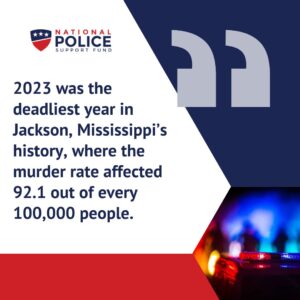The release of revised figures from the FBI has brought a dubious privilege for the city of Jackson, Mississippi: for the second year in a row, it is now topping the nation’s crime rates.
Should the trend continue, this once sleepy Southern capital will establish itself as one of the most dangerous locations in the country. While there is much that local authorities can do to reverse it, the current rates also have complex causes. They speak of years of inefficiency, poor community support, and a burnt-out, stretched-thin police force.
As the State (and country) gears up for a new leadership cycle, it’s worthwhile to examine what went wrong in Jackson — and what its next set of leaders should be prepared to do.
How Bad is Crime in Jackson, MS Really?
When we think about a “crime hotspot,” media headlines and decade-long stereotypes usually focus on the large, gang-troubled cities in the North. For years, Chicago, parts of New York, and Detroit have been inextricably linked with rioting and drug trade.
Naturally, a metropolis with over 10 million people will always see the largest number of muggings, robberies, or murders. But these totals fail to tell us how likely each citizen is to become a crime victim. And this is where things look truly urgent for Jackson: 2023 was the deadliest year in the city’s history, where the murder rate affected 92.1 out of every 100,000 people.

This puts the city’s homicide rate at over 10 times the national average of 6.8 per 100,000 people. Unfortunately, this is just the tip of the iceberg, as other types of violent or property crime, though less radical, also abound in the city:
- The city’s general violent crime rate is 6.2 per 1,000 people (compared to 2.45 for the state of Mississippi as a whole).
- This means that 1 in every 159 Jacksonians were the victim of a violent crime in 2023.
- The city’s general property crime rate is of 37.97 per 1,000 people (nearly twice the national average of 20)
- In 2023, 1 in 26 Jacksonians were the victims of property crime.
The nature of these crimes is also changing slightly. Burglary and home theft appear to be on the rise. Meanwhile, criminals are now younger than they used to be: just two years ago, the average criminal in the city was 33 years old. In 2023, they were 29.
What’s Happening Behind the Scenes?
According to Wes Jennings, criminologist and Gillespie Distinguished Scholar, Jackson’s dire circumstances stem from two main factors: insufficient policing and a more mobile, less engaged population.
For Jennings, the link between the size of the City’s Police Force and the crime rate is clear. While more officers do not automatically mean fewer crimes, “when they have historically low numbers relative to where they should be, it takes away officer time. [So they don’t have the time] to focus more on, you know, violence prevention and intervention.”
As an example, citizens commonly cite the long response times following 911 calls. The national standard is that 95% of all calls to 911 should be answered within 20 seconds. Then, police dispatch should take less than 10 minutes, especially for calls related to violence or assault.
In the City of Jackson, over 95% of all 911 calls are picked up within 20 seconds. However, it can take as much as 50 minutes for officers to arrive. Often, this happens because there are no available officers.
But Jennings also lists another major factor: people are leaving Jackson, and temporary renters are replacing long-time homeowners. Many of these just prefer to remain uninvolved when they see a crime: “If I’m in an area where I’m renting a property, and I see a broken window, I’m just glad it wasn’t my unit. And then as soon as I get enough resources to move out. So you don’t have a stake in the people or in the area.”
What Can We Learn From a City Under Siege?
The City of Jackson no longer publishes its number of active-duty police officers, it frequently struggles to staff enough patrols for routine crime-prevention exercises. And with low visibility comes the impression of impunity. Over time, the scarce presence of police has been normalized, making it seem easy to be a career criminal in the city.
If there’s a lesson to be learned for similar cities, it’s about the importance of human resources. Police Departments need to remain an attractive option for law-abiding citizens. Training, hiring, and incentivizing new generations of law enforcement officers is expensive, but the cost of letting police shrink is much higher.









